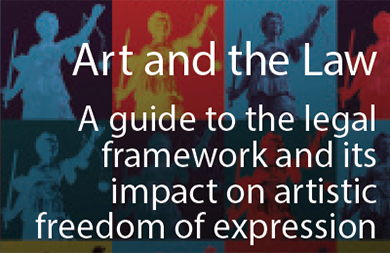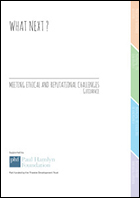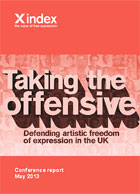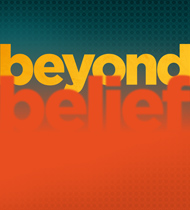4 Jun 2018 | Artistic Freedom, Europe and Central Asia, News and features, Risks, Rights and Reputations, United Kingdom
[vc_row][vc_column][vc_column_text]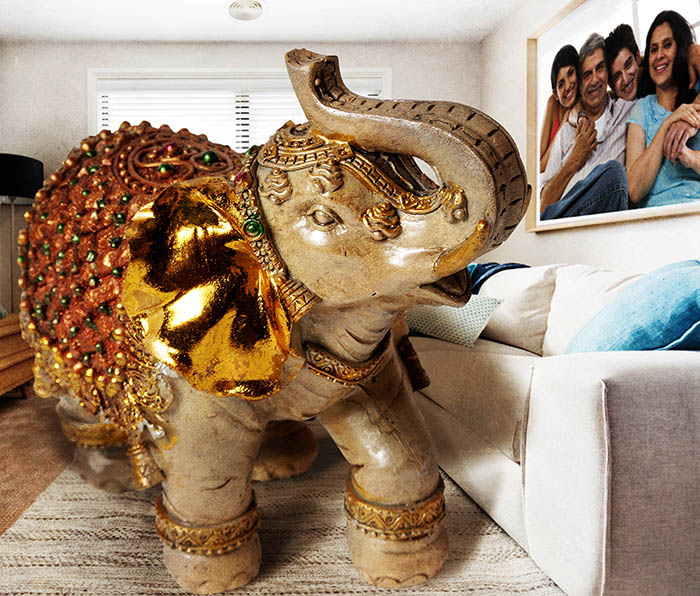
On Saturday 24 March the final performance of my play Elephant was cancelled in Birmingham, bizarrely the same city where, just over 13 years ago, my play Behzti was closed after protests against the show turned violent. Last month, a different kind of protest brought the run of Elephant to its premature end. The Football Lads Alliance were in town, apparently marching against “extremism” on the same day as the play’s final outing.
Elephant had completed a run in the Birmingham Rep’s studio space, The Door, and was on tour in the community. The last performance was for a closed group of visually impaired adults from a local charity and was scheduled to go on at the Old Joint Stock, a pub theatre in the city centre. However, because of the FLA demonstration, many local pubs, including the Old Joint Stock, which happened to be near the focal point of the rally, closed, following police advice.
The Rep found another location for the show, a large room at the theatre, but the charity did not feel safe bringing their group across town, such was the atmosphere of trepidation surrounding the march. With no audience, there was to be no show.
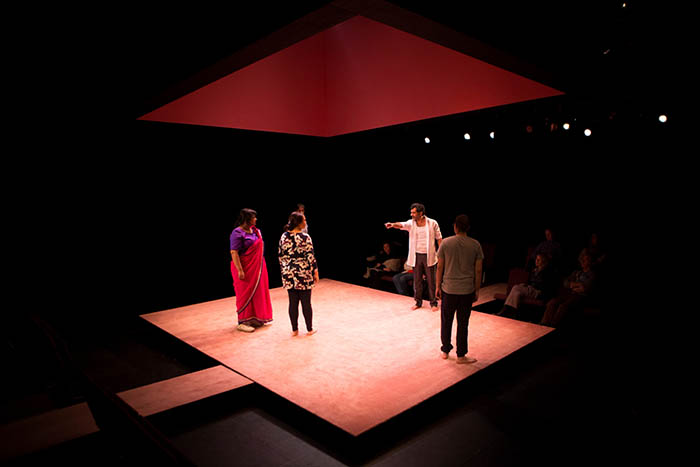
The cast of Elephant. Credit: Ellie Kurttz
Elephant was certainly not targeted like Behzti, it was simply collateral damage, as were the many businesses who lost significant income and the thousands of ordinary people who were intending to come into town to work and play in their city, but ended up changing their plans.
The FLA marching in Birmingham, a city defined by multiculturalism, was clearly an act of provocation. Everyone has a right to protest but the question here is about the policing of such action. The police facilitated the FLA and their cohort, most of whom came from outside the West Midlands, protecting their freedom to express their views. Afterwards the police framed the march as a success and Birmingham West Chief Superintendent Danny Long thanked the public for their understanding, saying: “Our aim was to facilitate the lawful protest and lawful assembly of all the groups here and that’s what’s happened.” Words which show little regard for the lawful freedoms of local people.
The clear message given out by the police was one of fear – keep a low profile and stay away, because today this is not your city. It’s a dysfunctional way of keeping order, one that we’ve got used to and don’t question. Peddling this type of fear gives credence to abhorrent views and fuels underlying tensions.
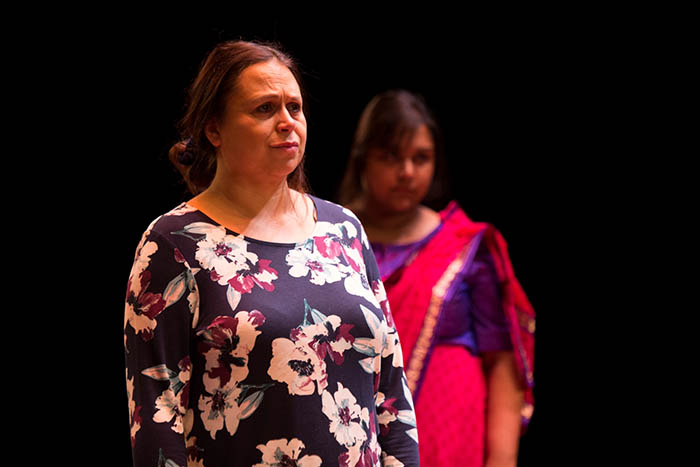
Yasmin Wilde as Deesh in Elephant. Credit: Ellie Kurttz
The West Midlands police have considerable form. Five years after Behzti was cancelled (the main reason being that because the police said they could not guarantee the safety of staff or public), Penny Woolcock’s film 1Day was removed from Birmingham cinemas after the same police force suggested it might incite gang violence. In 2010, during rehearsals of my play Behud, the police asked the Coventry Belgrade to pull the production, as they were expecting protests. The theatre refused and the show continued without incident.
Each of these situations tells us more about the police’s anxieties than our own. Given their attitude around the FLA march, there is clearly still much to learn about managing order in a city where almost half the population do not identify as white British. In her speech at the demonstration, the leader of far-right organisation For Britain, said: “We are living through a dark time in this country.” It’s a dark time indeed when the freedoms of racists brought in to intimidate and frighten a community, trump the freedoms of that very community to live their lives.
What happened in Birmingham last month raises questions of power and control. Who runs our cities and who are they for? The FLA march left a trace of unease and fracture in a city where many of its inhabitants already feel marginalised.
Elephant tells the story of a woman who is ostracised for telling the truth about being abused as a child. Although the circumstances of the play’s cancellation were totally different to Behzti in 2004, it’s hard not to feel a similar sense of sadness and loss at having been silenced.
Facilitating an inflammatory protest at the expense of the freedoms of the silent majority is no victory and shutting people out of their own city is no fit way of dealing with tensions between communities. Public order should be maintained in a fair and equal way, otherwise those who shout loudest get heard, and everyone else ends up without a voice.[/vc_column_text][vc_column_text]
ALSO READ
[/vc_column_text][/vc_column][/vc_row][vc_row][vc_column width=”1/3″][staff name=”Gurpreet Kaur Bhatti on Behzti” profile_image=”100618″]When I started writing my third play, Behzti, in 2003 I could never have imagined the furore which was going to erupt. There was an atmosphere of great tension in the lead up to its production in December 2004, and it was indeed an extraordinary time. Mass demonstrations culminated in a riot outside the theatre. Read on[/staff][/vc_column][vc_column width=”1/3″][staff name=”Birmingham Repertory Theatre: Behzti” profile_image=”100620″]In December of 2004, Birmingham Repertory Theatre staged the world premiere of Behzti, a new play by Gurpreet Kaur Bhatti, in the smaller of its two theatres, The Door, which is a space exclusively dedicated to the production and presentation of new plays. “Behzti” is a word in common usage amongst the Punjabi speaking community meaning “dishonour” or “shame”. Read on[/staff][/vc_column][vc_column width=”1/3″][staff name=”Challenging the UK’s risk averse culture” profile_image=”100621″]It’s easy to dismiss the importance of arts in a democracy; its social value is disregarded when it is seen as the province of the rich and privileged. Yet when we look to more authoritarian regimes across the globe Index is reminded constantly of the importance of the role of arts as a voice of dissent and the extraordinary amount of time that repressive states spend suppressing it. Read on[/staff][/vc_column][/vc_row]
3 May 2018 | Journalism Toolbox Spanish
[vc_row][vc_column][vc_custom_heading text=”El respeto y el civismo son los enemigos de la libertad de expresión: no se puede legislar para los sentimientos de la gente”][vc_row_inner][vc_column_inner][vc_column_text]
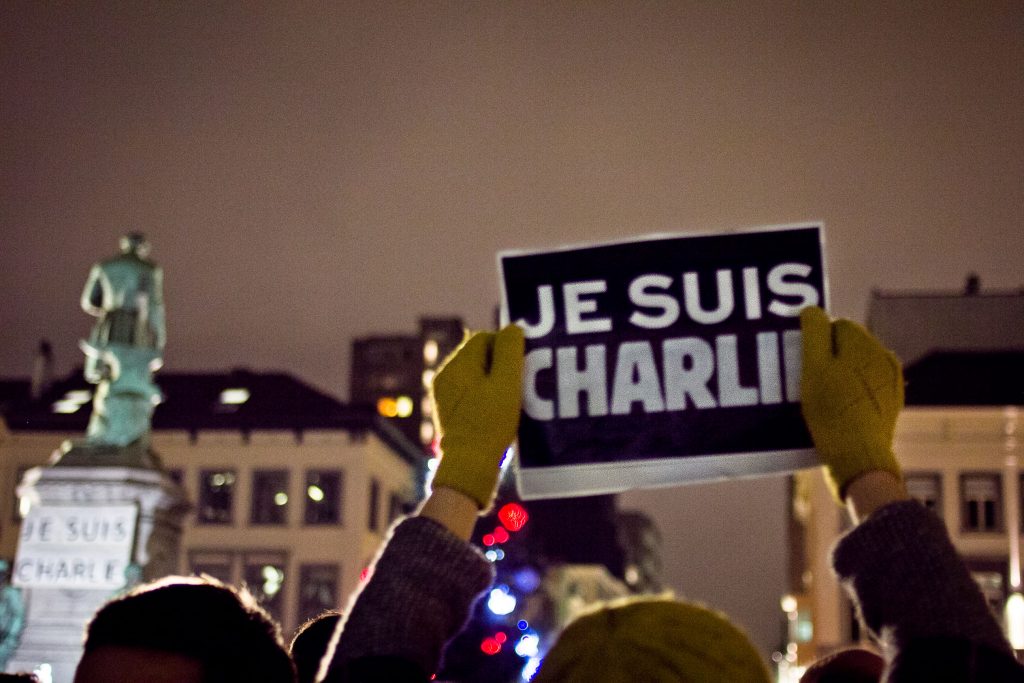
Un cartel de “Je suis Charlie” en una vigilia por los periodistas asesinados en el atentado de Charlie Hebdo en Francia, 2015, Valentina Calà/Flickr
[/vc_column_text][/vc_column_inner][/vc_row_inner][/vc_column][/vc_row][vc_row][vc_column][vc_column_text]
«Es evidente que el antiguo equilibro entre la libre expresión y el respeto por los sentimientos de los demás se hace cada vez más insostenible», se lamentaba Simon Jenkins, «pope» del columnismo, en el Sunday Times. Se refería a la polémica, por entonces en plena ebullición, sobre la tira cómica que publicó el periódico danés Jyllands-Posten parodiando al profeta Mahoma. «No puede haber mejor defensa de la libertad de expresión que frenar sus excesos y respetar su cortesía», concluía Jenkins.
Un año más tarde, la revista satírica francesa Charlie Hebdo y su director eran procesados en un caso llevado a los tribunales por dos organizaciones musulmanas, que denunciaban una agresión pública contra un grupo de personas a causa de su religión («injure stigmatisant un groupe de personnes à raison de sa religion»). La revista había reproducido aquellas tiras cómicas e incluido una de su propia cosecha en la cubierta. En marzo de 2007, el tribunal falló a favor de Charlie Hebdo y desestimó la denuncia de las organizaciones musulmanas.
Jenkins es la voz de la moderación y el civismo. Libertario declarado en cuestiones de reformas de leyes que van desde la homosexualidad hasta la caza del zorro, su visión es que una sociedad justa ha de esforzarse por mantener valores en equilibrio, en lugar de perseguir exigencias de absolutismo por un lado a costa del otro. Su análogo estadounidense podría ser la escritora KA Dilday. Acerca del caso de Charlie Hebdo, Dilday declaraba en la web de openDemocracy no considerarse «ferviente partidaria de controlar qué puede expresarse y qué no». Sí ve, sin embargo, «cierto sentido de la justicia» en procesos como el mencionado arriba. Al fin y al cabo, son un modo efectivo de estimular el debate y llamar la atención sobre querellas, si bien en un sentido que los «guerreros-filósofos» franceses, defensores del término, no reconocen.
La voz de la moderación, el civismo y el equilibrio es, en resumen, políticamente tóxica. Fabrica el falso supuesto de que ser considerados con los sentimientos de los demás —una virtud en los asuntos privados— es de la incumbencia de las políticas públicas. Esta idea ha de rechazarse frontalmente cuanto antes.
El conflicto entre las sensibilidades religiosas y la libertad de publicación proviene de mucho antes que el asunto de las caricaturas danesas. No obstante, en la política y sociedad británica, los principales denunciantes hasta la década de 1990 eran cristianos ortodoxos que ponían de manifiesto su preocupación por la erosión generalizada de las buenas costumbres. En 1977, Mary Whitehouse, en nombre de la National Viewers’ and Listeners’ Association, ganó una sonada victoria legal en una acción judicial contra el periódico Gay News. El objeto de su repulsa era un poema en el que Jesús salía representado como un homosexual promiscuo; según ella, una calumnia blasfema contra la fe cristiana. Incluso en aquel entonces, la opinión general vio la condena como un caso de idiosincrasia jurídica y anacronismo social. De haber defendido su denuncia como una querella por perjuicios a los sentimientos de los creyentes cristianos, no habría tenido ningún recurso legal y lo más seguro es que hubiera sido ignorada por la opinión general. Sin embargo, habría estado adelantándose a una noción que en las últimas dos décadas se ha convertido no solo en habitual en esos mismos círculos, sino casi axiomáticos entre algunos de ellos.
Más de una década más tarde, el ayatolá Jomeini emitía una fetua llamando al asesinato de un ciudadano británico, Salman Rushdie, por escribir una novela. Los líderes musulmanes del subcontinente indio ya habían condenado el libro, Los versos satánicos, por contener insultos al Islam. La fetua puso el asunto en el centro de la política internacional. Fue entonces cuando emergió un discurso distintivo en el debate occidental.
Como es el caso con muchos acontecimientos de la historia política reciente de Reino Unido, una de las fuentes más informativas —a menudo sin quererlo— son los voluminosos diarios editados del ex ministro del gobierno Tony Benn. En su entrada del día 15 de febrero de 1989, Benn describe un debate sobre el caso de Rushdie en una reunión del equipo de campaña de los diputados laboristas de izquierda. Algunas de las respuestas que recoge, si bien plagadas de clichés, son claramente reconocibles como consignas tradicionales de la política radical: «Mildred Gordon [antigua trotskista que se hizo diputada cumplidos los 60] dijo que todos los fundamentalistas y todas las iglesias instituidas son enemigos de los trabajadores y el pueblo». Pero Benn pasa después a Bernie Grant, diputado por Tottenham, ya fallecido, a menudo señalado —erróneamente— como uno de los primeros diputados negros de Reino Unido. Benn declara: «Bernie Grant seguía interrumpiendo, diciendo que los blancos querían imponer sus valores sobre el mundo. La Cámara de los Comunes no debería atacar a otras culturas. No estaba de acuerdo con los musulmanes de Irán, pero apoyaba su derecho a vivir sus vidas como quieran. Sostenía que para los negros había problemas más graves que la quema de libros».
La idea de que la libertad de expresión es una imposición etnocentrista sobre otras culturas, hacia la cual una política verdaderamente igualitaria extendería su respeto, se ha desarrollado enormemente desde entonces, de un modo menos crudo y populista. La forma descafeinada de ese principio es que una cultura fundada en ideas compartidas libremente ha de refrenarse ante las sensibilidades de los demás. En palabras del erudito islámico Tariq Ramadan: «En lugar de obsesionarnos con leyes y derechos —acercándonos a un derecho tiránico a decir cualquier cosa—, quizá sería más prudente llamar a todos los ciudadanos a ejercer su derecho a la libertad de expresión de forma responsable y tener en cuenta las diversas sensibilidades que componen nuestras sociedades modernas y plurales».
Sentimientos como este se afianzaron a cuenta de lo de Rushdie, y han demostrado ser un componente duradero de nuestra cultura política. En 1990, un año después de la fetua, Rushdie escribió: «Siento como si me hubieran arrojado, como Alicia, a un mundo más allá del espejo, en el que el sinsentido es el único sentido disponible. Y me pregunto si alguna vez seré capaz de salir».
Los líderes de occidente son expertos en hablar desde ese sentido que menciona. El primer presidente Bush respondió audazmente, una semana después de la emisión de la fetua, que la amenaza de asesinato era «profundamente ofensiva». El gobierno japonés declaró con ansiedad que «mencionar y promover el asesinato no es algo digno de alabanza». El Gran Rabino de Reino Unido, el Dr Immanuel Jakobovits, observó con evidente imparcialidad, pero genuina estupidez rayando en la crueldad: «Tanto el Sr Rushdie como el Ayatolá han abusado de la libertad de expresión».
[/vc_column_text][/vc_column][/vc_row][vc_row][vc_column][vc_column_text]
Analizando estas sentencias, el escritor Jonathan Rauch, en su libro de 1993 Kindly Inquisitors (del cual extraigo las citas), identificó la tendencia, entre los intelectuales de occidente, de repudiar la sentencia pero no la idea de que Rushdie había cometido un crimen: «Si seguimos por este camino, significa que aceptamos el veredicto de Jomeini y simplemente le estamos regateando la sentencia. Si la obedecemos, aceptamos que en principio lo que ofende debería reprimirse, y lo que hacemos es discutir qué ofende y qué no… eso sí es ofensivo».
Este es el elemento ausente en el debate sobre el alcance y la regulación de la expresión. La idea de que expresarse con libertad, si bien es importante, ha estar en equilibrio con evitar la ofensa es petición de principio, ya que da por sentado que la ofensa es algo que ha de evitarse. La libertad de expresión, en efecto, hiere, pero no hay nada de malo en ello. El conocimiento avanza gracias a la destrucción de malas ideas. La burla y el escarnio se cuentan entre las herramientas más poderosas de ese proceso. Tomemos por ejemplo Cándido de Voltaire, o los escritos de H.L. Mencken sobre el caso del juicio de Scopes, saturados de desprecio por los oscurantistas religiosos que se oponían a la enseñanza de la evolución en las escuelas de Tennessee.
Es inevitable que se ofendan quienes ven a otros mofarse de sus más profundas convicciones, y es posible —aunque no obligatorio, y se da el caso de que no sale de mí— extenderles simpatía y compasión. Pero no tienen derecho a protección, mucho menos compensación, en la esfera pública, por muy groseros y repugnantes que sean los sentimientos expresados. Una sociedad libre no legisla en el reino de las creencias; por ende, no debe ocuparse tampoco del estado de las sensibilidades de sus ciudadanos. Si lo hiciera, no habría en principio ningún límite a los poderes del estado, ni siquiera en el ámbito privado del pensar y el sentir.
No le ha ayudado al debate —si acaso lo ha empañado aún más— un uso impreciso de la palabra «respeto». Si se trata de una mera metáfora del libre ejercicio de la libertad religiosa y política, entonces es un principio incuestionable, pero también un uso redundante y poco claro. El respeto por las ideas y aquellos que se aferran a ellas es otra historia. Las ideas no tienen derecho a nuestro respeto; se ganan el respeto según su capacidad de hacer frente a las críticas. Incluso algunos fervientes defensores de la libertad titubean en este punto. El activista pro derechos humanos Peter Tatchell escribió hace poco acerca de un debate televisivo particularmente sesgado: «Hasta los musulmanes supuestamente moderados del programa de anoche exudaban un tufillo a hipocresía. Ibrahim Mogra, del Consejo Musulmán Británico (MCB), dijo: ‘No queremos imponerle nuestro modo de vida a nadie. Lo único que queremos es vivir en el respeto mutuo’. Nobles sentimientos. Una pena que no sea la realidad». Resulta que exigir respeto no es un noble sentimiento. Es, como mucho, una cualidad que se obtiene a través de la robustez intelectual de las ideas de uno en la arena pública.
Un añadido más que complica el debate es un retorno —uno bastante oportunista, por cierto—, al concepto de las costumbres y su subclase, los tabús. En diciembre de 2006, el régimen teocrático iraní organizó una conferencia en la que negaban el Holocausto, al parecer, como un gesto de represalia por la caricatura danesa. Se da la casualidad de que participé en un debate en Londres al mes siguiente con un representante del Consejo Musulmán Británico, Inayat Bunglawala, que trató las dos provocaciones como análogas de forma explícita. No había «necesidad», decía, de montar la conferencia, un malentendido total de las bases de la objeción. La negación del Holocausto está mal, no porque sea ofensivo, sino porque es falso. Es una hipótesis especulativa que puede mantenerse de forma coherente solo si se ignoran o falsifican pruebas históricas. Hay leyes en algunos países europeos contra estas forma de antisemitismo, y son desacertadas y dañinas por motivos similares a los que he expresado. La labor de exponer la falsedad de las afirmaciones de los negacionistas del Holocausto corresponde a historiadores competentes, no a los abogados. La calidad de ofensivo es irrelevante a la cuestión.
Aparte, se da una cuestión de pragmática. Si quienes tienen profundas convicciones ven que reciben compensación cuando alguien hiere sus sentimientos, estarán a la caza del sufrimiento mental. Cuando un grupo lo consiga, otros percibirán el incentivo para confeccionar exigencias comparables. En Birmingham, hace dos años, unos manifestantes forzaron el cierre de una obra de teatro, Behzti, de Gurpeet Kaur Bhatti, que describía el maltrato que sufrían las mujeres sij por parte de hombres de su misma religión. Con inepta jocosidad a la par que concisión, un corresponsal de la BBC informaba: «Si tuviéramos que escribir una sinopsis teatral para lo que Birmingham acaba de presenciar con Behzti, podríamos hacerlo en ocho palabras: ‘obra ofende a comunidad, comunidad protesta, obra cancelada’».
Los activistas de un grupo de presión llamado Christian Voice, entonces —lejos de ser una coincidencia—, insistieron en sus exigencias particulares. El espectáculo en vivo Jerry Springer: The Opera se enfrentó a protestas y amenazas de acción judicial por blasfemia cuando se retransmitió por la BBC en 2005 y de nuevo cuando comenzó su gira en 2006. «Puedo decir con convicción que el espectáculo es extremadamente vulgar, ofensivo y blasfemo», escribía el director de la organización en una carta a los teatros, instándolos a que cancelasen las funciones. Y, dado el precedente, ¿por qué no habría de exigir tal cosa?
En un intento por explicar el asunto de Behzti a sus lectores franceses, la corresponsal de Libération en Londres, Anès Poirier, escribía: «Dans une situation pareille, on attend d’un gouvernement qu’il défende l’auteur menacé». Advirtió que la ministra del gobierno británico responsable de relaciones comunitarias, Fiona McTaggart, hizo precisamente lo contrario. Más bien, McTaggart recibió de buena gana la calma que sucedió a la cancelación de la obra de teatro. A menudo nos hace falta un observador externo para apreciar verdaderamente la corrupción de nuestra propia cultura política.
Este malestar suele ser el resultado de reconocer el deber de respetar un derecho. Respetar las creencias y los sentimientos de otros es una afectación letal de las políticas públicas. Es fácil representar la libertad de expresión como proclive a causar perjuicios, precisamente porque es la verdad. El marco legal que parte de ello es contrario a la lógica, pero esencial: no hay que hacer nada. La defensa de una sociedad libre pasa por no tomar posiciones sobre lo que sale de ella, e insistir, en su lugar, en la integridad de sus procedimientos.
[/vc_column_text][/vc_column][/vc_row][vc_row][vc_column][vc_column_text]
Oliver Kamm es autor y columnista para The Times
This article originally appeared in the summer 2007 issue of Index on Censorship magazine
Traducción de Arrate Hidalgo
[/vc_column_text][/vc_column][/vc_row][vc_row content_placement=”top”][vc_column width=”1/3″][vc_custom_heading text=”What New Labour did for free speech” font_container=”tag:p|font_size:24|text_align:left” link=”url:https%3A%2F%2Fwww.indexoncensorship.org%2F2007%2F06%2Fwhat-new-labour-did-for-free-speech%2F|||”][vc_column_text]Index takes a critical look at the health of free speech in the UK on New Labour’s tenth birthday in power. New restrictions on what you can say — and where you can say it — mean we have to mind our language more than we used to. Has the UK become a less tolerant society? How much has been sacrificed in the name of national security? Leading commentators examine the defining influences of the decade on free speech in the UK and assess how far new Labour has delivered on its promises to introduce more open government.
With: Alistair Beaton; A C Grayling; Peter Wright[/vc_column_text][/vc_column][vc_column width=”1/3″][vc_single_image image=”89177″ img_size=”medium” alignment=”center” onclick=”custom_link” link=”https://www.indexoncensorship.org/2007/06/what-new-labour-did-for-free-speech/”][/vc_column][vc_column width=”1/3″ css=”.vc_custom_1481888488328{padding-bottom: 50px !important;}”][vc_custom_heading text=”Subscribe” font_container=”tag:p|font_size:24|text_align:left” link=”url:https%3A%2F%2Fwww.indexoncensorship.org%2Fsubscribe%2F|||”][vc_column_text]In print, online. In your mailbox, on your iPad.
Subscription options from £18 or just £1.49 in the App Store for a digital issue.
Every subscriber helps support Index on Censorship’s projects around the world.
 SUBSCRIBE NOW[/vc_column_text][/vc_column][/vc_row]
SUBSCRIBE NOW[/vc_column_text][/vc_column][/vc_row]
20 Dec 2017 | Artistic Freedom, News and features, Risks, Rights and Reputations
[vc_row][vc_column][vc_column_text]
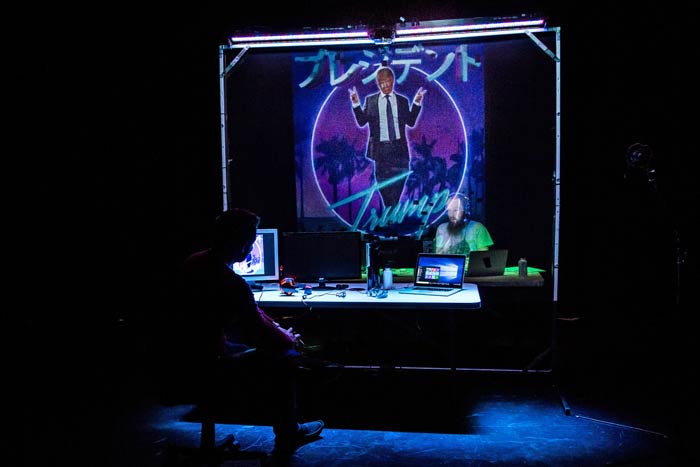
Playwright Javaad Alipoor told The Guardian that “the response to radicalism is to shut down debate for young people”. His play The Believers Are But Brothers will be performed at the Bush Theatre beginning 24 January 2018.
It’s easy to dismiss the importance of arts in a democracy; its social value is disregarded when it is seen as the province of the rich and privileged. Yet when we look to more authoritarian regimes across the globe Index is reminded constantly of the importance of the role of arts as a voice of dissent and the extraordinary amount of time that repressive states spend suppressing it. If the spoken or written word, if performance or image did not have power, then dictators wouldn’t spend so much time actively silencing and persecuting artists.
But let’s not just look to repressive regimes when we want to talk about censorship. Artists are often the canaries in the mine, a leading barometer of freedom in any country, with the ability to powerfully capture uncomfortable truths. The consequences are different here in the UK, we don’t imprison artists or worse, but ensuring the creation of work by artists who are by law, free to speak, means creating the environment in which risks can be taken.
Yet, in the UK in 2017, when arts have a critically, crucially important role to express and process the diverse and often divergent opinion and experience that coexist in our society, we have created a risk-averse culture. A raft of social, legal and political pressures threaten to limit the space available for expression. New legislation, lack of clarity around policing roles and responsibilities, fear of media backlash or social media storm, loss of funding, means that arts organisations are not always confident about taking the kinds of risks they would like – or indeed need – to make the best art. If only a few groups feel able to explore the most difficult subjects or give voice to underrepresented communities, then, when something goes wrong, it gets harder for the entire arts community to address sensitive issues.
In 2010, when I started in this work, freedom of expression was not a priority for the arts sector; it was assumed safe and left to fend for itself. This never works, as Michael Scammell, the first editor of Index reminds us: “Freedom of expression is not self-perpetuating…”.
When we asked a conference of theatre directors at the time which was more important: audience development or freedom of expression, 100% said the former. Audience development, as I understand it, is about bringing in new audiences, reaching out to find fresh creative voices and breaking the homogenous mould of arts audiences. Yet the call for inclusivity and equality of access has tended to be resolved around a desire to please and a fear of offending, leading to a loss of appetite for the unpopular expression and risk-taking, as identified in Index’s 2013 conference Taking the Offensive and numerous case studies as part of Index’s Art and the Law guides. And still the arts remain obstinately homogenous.
Playwright, director Javaad Alipoor said in a recent interview with Index: “There is a whole discourse about risk [in the theatre industry] that we need to shift. We take risks all the time, but the way we are willing to do it is mega-racialised. Some people are a risk and some people aren’t a risk. I overheard some relatively sensible liberal people describing the appointment of Kwame Kwei-Armah [ newly appointed director of the Young Vic] as a bold move. I thought – it’s a good move. Here is an internationally successful guy, running an internationally successful theatre.”
Look at the two 2015 plays about radicalisation: Homegrown, commissioned by the National Youth Theatre (NYT) written and directed by Nadia Latif and Omar El Khairy, was cancelled; Another World – Losing our Children to Islamic State – by Gillian Slovo and developed by Nicolas Kent, commissioned by the National Theatre, was produced. Whatever else might have happened at NYT, the fact remains that Latif and El Khairy, two creatives from a Muslim background, and the 115 young people they were working with, were not allowed to speak, while two establishment figures were free to express their view of the same issue. This illustrates Alipoor’s point perfectly.
Add to this the role of the police in cancelling work, going all the way back to Gurpreet Kaur Bhatti’s play Behzti in Birmingham in 2004; more recently the removal of ISIS Threaten Sylvania on the advice of the police in 2015; the policing of the Boycott the Human Zoo picket that led to the cancellation of the Barbican production of Exhibit B in London; the banning of music performances by police in Leicester and Bristol at the behest of local Islamic leaders. All point to the uneasy relations between state, the arts sector and artistic expression about issues of race and religion. A policing pattern has emerged, in which it is easier to remove what is deemed to be provocative and so dispel or prevent protest, than manage the situation and allow the artwork to go ahead. The arts sector has been caught out each time.
This pattern of policing interferes with the fundamental right to freedom of expression, something Index has taken up with National Police Lead on Public Order. Index is now working with a Senior Police Trainer to develop better support for the arts sector. His team will contribute to our training programme next year, which will also feature an introduction to our guidance on the legal and rights framework for artists and arts organisations – see below.
We are living in a society and at a time, when the lived experience of hundreds of thousands of people is becoming unspeakable. Although it doesn’t appear to be the case that Prevent officers are checking out what is going on in our theatres and galleries, the impact of Prevent as a force for pervasive self-censorship across Muslim communities is massive and one of the main free speech issues of the day. This will of course influence what makes its way into our arts venues. Add to that other invasive state surveillance powers, the rolling back of human rights generally, the arts has an ever more important role to play to tackle these issues, to ask the most important questions, to challenge growing authoritarian tendencies; playing safe is not an option.
The sector plays a vital role in providing space for open debate, but as Svetlana Mintcheva, an international arts and censorship experts writes: “That role is threatened if those institutions fail to take on real controversies around difficult and emotionally charged subject matter because some of that subject matter may be offensive or even traumatic. Unless they are prepared to welcome genuine conflict and disagreement, cultural institutions will operate as echo chambers under the pall of a fearful consensus, rather than leaders in a vibrant and agonistic public sphere.”
These are some of the issues that we are grappling with in our training: Rights, Risks & Reputations – Challenging a Risk Averse Culture, aiming to give arts leaders the information they need to take difficult, risky decisions more confidently. They will complement the efforts that many organisations are making, and have been making for decades in some cases, to diversify, by reinforcing the importance of risk and controversy in achieving these aims. To this end, we will be taking a close look at the social importance of risk and controversy and the steps needed to reinforce appetite and capacity for risk-taking; how the powerful complementarity of the rights to freedom of expression and equality gives a useful framework for this work. Looking at issues that could lead to self-censorship – fear of causing offence and/or protest and confusion around new counter-terrorism legislation, we will dig into Index’s legal guides for arts on three legally protected areas of society: Counter-Terrorism, Race and Religion and Public Order; Public Order police trainers will present their perspective on how and when to work with the police around artwork that might generate protest in the public space; and there will be a module on ethical fundraising.
The second part of the Michael Scammells statement quoted above is “freedom of expression...has to be actively maintained by the vigilance of those that care about it”. Freedom of expression is an active stance full of challenges, just like equality – both need to be enacted, not left on the shelf in a policy document. Freedom of expression where everyone agrees is not worth the paper it is written on; it will always include the right to shock, insult and offend. And, coupled with equality, it changes whose stories, imagination, revelations and visions shock, insult and offend even as they inspire, inform and transform.[/vc_column_text][/vc_column][/vc_row]
16 May 2016 | Art and the Law Commentary, Artistic Freedom Commentary and Reports, Campaigns -- Featured, mobile, News and features
Julia Farrington, associate arts producer, Index on Censorship, participated in the Theatre UK 2016 conference on 12 May 2016. This is an adapted version of her presentation.
In January 2013 I organised a conference called Taking the Offensive for Index on Censorship, in partnership with the Free Word Centre and Southbank Centre. The conference was held to debate the growth of self-censorship in contemporary culture, the social, political and legal challenges to artistic freedom of expression and the sources of these new challenges.
The report from the conference concluded that censorship and self-censorship are significant influences in the arts, creating a complex picture of the different ways society controls expression. Institutional self-censorship, which many acknowledged suppresses creativity and ideas, was openly discussed for the first time.
Lack of understanding and knowledge about rights and responsibilities relating to freedom of expression, worries about legal action, police intervention and loss of funding, health and safety regulations, concern about provoking negative media and social media reaction, and public protests are all causing cultural institutions to be overly cautious.
One speaker at Taking the Offensive suggested that we are fostering a culture where “art is not for debate, controversy and disagreement, but it is to please”.
There is above all, unequal access to exercising the right to artistic freedom of expression, with artists from black and minority ethnic encountering additional obstacles.
Many felt that far greater trust, transparency and honesty about the challenges being faced need to be developed across the sector; dilemmas should be recast as a necessary part of the creative process, to be shared and openly discussed, rather than something to keep behind closed doors. This will make it possible for organisations to come together when there is a crisis, rather than standing back and withholding support: “if we collectively don’t feel confident about the dilemmas we face how can we move on with the public?”
I think there have been significant changes in the three years since the conference and, whilst I think the same challenges persist, there have been some really positive moves to tackle self-censorship within the sector. The growth of What Next? has created precisely the platform to debate and discuss the pressures, dilemmas and controversies that the conference identified. What Next? has produced guidance on navigating some of these issues and is developing more resources on how organisations can support each other when work is contested.
Index on Censorship responded to the clear call from the conference for the need for guidance about legal rights and responsibilities if we are to create a space where artists are free to take on complex issues that may be disturbing, divisive, shocking or offensive.
We have published information packs around five areas of law that impact on what is sayable in the arts: Public Order, Race and Religion, Counter Terrorism, Child Protection and Obscene Publications. They are available on the website under our campaign Art and Offence. These have been well received by the sector and read by CPS and police and we are developing a programme of training which will, if all goes well, include working with senior police officers.
At the same time, pressures from outside the sector have intensified.
The role of the police in managing the public space when controversial art leads to protest has come into sharp relief over the past two-three years where they have repeatedly “advised” venues to remove or cancel work that has caused protest or may cause protest.
I did a case study on the policing of the picket of Exhibit B at the Barbican in London which is available on the Index website; and in the same year, the Israeli hip hop opera the City was closed in Edinburgh on the advice of the police.
More worryingly the police “advice” has also led to the foreclosing of work that is potentially inflammatory – as in Isis Threaten Sylvannia an art installation by Mimsy, that was removed from an exhibition called Passion for Freedom from the Mall Gallery last year.
With the removal of Isis Threaten Sylvania, we see a shift from the police advising closure following protest to the police contributing indirectly or directly to the decision to remove work to avoid protest.
In this case freedom of expression was actually given a price — set at £7,200 per day for the five days of the exhibition — the price set by the police for their services to guarantee public safety.
The police took the view that a perfectly legal piece of art, which had already been displayed without incident earlier in the year, was inflammatory. And in the balance of things as they stand, this opinion outweighs:
- the right of the artist to express him or herself;
- the organisation’s right to present provocative political art;
- the audience’s right to view it;
- and those that protest against it, the right to say how much they hate it, including when that means that they want the art removed.
This new chapter in the policing of controversial art sets alarm bells ringing and represents a very dangerous precedent for foreclosing any work that the police don’t approve of.
But going against police advice is problematic.
In Index’s information pack on Public Order we asked our legal adviser, working pro bono, questions that many artists and arts managers are concerned about:
What happens if police advise you not to continue with presenting a piece of work because they have unspecified concerns about public safety – and yet tell you it is your choice and they can only advise you?
The artist would in principle be free to continue with the work. It would be advisable, however, to ensure that the reasons held by the police were understood. It may also be prudent to take professional advice…
And then what responsibilities for safety do employers have to staff and the public in relation to continuing with an artwork that has been contested by the police?
An organisation also has duties to their employees and members of the public on their premises. These duties may extend to making an organisation liable in the event of injury to a person resulting from the unlawful act of a third party if, for example, that unlawful act was plainly foreseeable – in other words the police have given their warning.
What are the options for an arts organisation to challenge police advice at the time of the protest itself?
If the organisation believes that it has grounds to challenge police directions to avoid a breach of the peace, it can seek to take legal action on an urgent basis. Realistically…legal action will not be determined until some time later and until it is determined by the courts, the organisation and/or its members or employees would risk arrest if they do not comply with police directions.
So – what starts out as police advice which implies genuine choice, on closer inspection transforms into a Hobson’s Choice where failure to follow that advice could lead to arrest.
On this evidence, both self-censorship and direct censorship are the undesirable outcomes of this as yet unchallenged area of policing.
But the Crown Prosecution Service has read and approved the packs and our law packs are in the system with the police.
The ideal policing scenario is to keep the space open for both the challenging political art and the protest it provokes. Both are about freedom of expression, what we have to avoid is the heckler’s veto prevailing.
Going back to other recent examples of censorship — questions remain about the role of the police in the decision to cancel Homegrown the National Youth Theatre production of a play about the radicalisation of young Muslims by writer Omar El-Khairy and director Nadia Latif. This was followed earlier this year by the presentation, without incident, of Another World: Losing our Children to Islamic State at the National Theatre, play on similar themes by Gillian Slovo and Nicolas Kent.
I mention Another World because it is important to state the obvious, that all the work that has been contested by the police and been cancelled, relates to work about race and religion and the majority of artists involved in work that has been foreclosed are from black and minority ethnic communities.
Looking through the lens of freedom of expression, each case of censorship gives a valuable opportunity to view a specific snapshot of relationships within society and to analyse the power dynamics operating there, both directly around the censored work — whose voices are and aren’t being heard in the work itself, and in the field and context in which the work is taking place and again looking at who is in control, who decides what voices are heard. I don’t have time here to go into an analysis of each case, but what emerges is that freedom of expression is, as it stands, a biased affair in the UK and I believe will remain so while our society and our culture are not equal.
As well as these new cases of censorship that we have seen since the 2013 conference, we have also seen new government policy, legislation and regulations which place increasingly explicit controls on what we can say and have a chilling effect on many areas of expression and communication, and interaction with government.
Many campaigners and charities see the Criminal Justice and Courts Act 2015 as designed to deter charities from intervening in judicial reviews — the most important legal channel we have to call authorities to account; the Investigatory Powers Bill, better known as the Snoopers’ Charter gives the surveillance state more powers; the Prevent Strategy requires us to police each other – surveillance and policing our neighbours — two nasty authoritarian tactics, and most recently the anti-advocacy clause would effectively ban organisations from using government funds for lobbying — stifling dissent. It was due to come into law on 1 May but the consultation period was extended and it might be kicked into the long grass.
The government has made it clear that it wants us to see ourselves predominantly if not exclusively as businesses and in response we have successfully made the case that the arts contribute massively to the economy.
But we know we are so much more. The arts are a vital, at best magnificent and effective player in civil society — especially when you define civil society as “a community of citizens linked by common interests and collective activity”.
With our core values and freedoms under attack, the arts and other civil society bodies are responding. The discussion about the role of the artist in taking on the big issues in society — from climate change to the refugee crisis — has, from where I stand, definitely intensified and gone up the agenda over the past three years, both here and internationally, as the pressure on our freedoms and values also intensifies domestically and internationally.
To fully participate in society and to create art that calls power to account, we need to continue to identify, analyse and tackle the causes of self-censorship within the sector, and stand together to enter into dialogue with the various agents of control that we identify in the process.
Art can help us imagine and bring about a more equal and just future.






